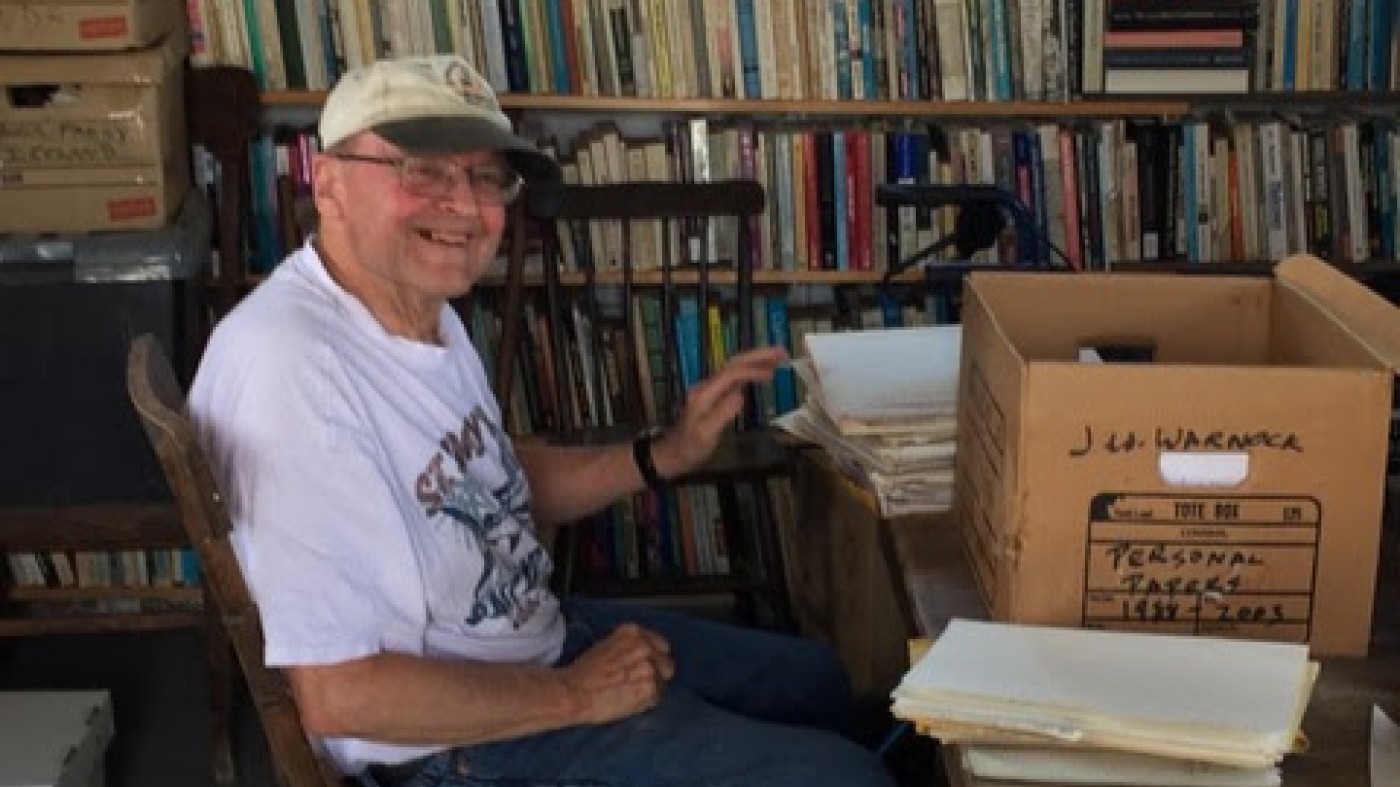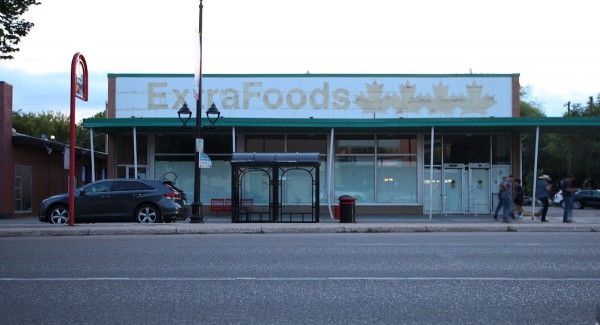Briarpatch: Remembering John W. Warnock

Jack sorting his personal papers in preparation for delivery to the Provincial Archives of Saskatchewan, summer 2017. This was in his library on the land purchased by his friend Susan near Bulyea, Saskatchewan, where they worked together to convert an old horse barn into an off-the-grid cabin. He would spend early mornings sitting by the window overlooking crop fields, scouring articles and newspapers, annotating and underlining them with his ever-present red pen. Photo courtesy of Susan Ferren.
John William Warnock – better known as Jack – passed away at the age of 88 years on May 27, 2022 in Victoria, British Columbia. Jack contributed numerous articles to Briarpatch Magazine over the years and was the assistant editor and a feature writer from 1990 to 1995. He lived in Saskatoon from 1963 until 1974. During this time, he worked as a professor at both the University of Saskatchewan and the University of Regina, where he taught economics, political studies, and sociology. After a stint out west, Jack returned to Saskatchewan in 1986, this time residing in Regina until 2018 when he moved to Victoria.
To remember Jack and his contributions to progressive movements in Saskatchewan and beyond, Briarpatch interviewed Jack’s longtime friend and intellectual companion, Susan Ferren.
Susan: I met Jack Warnock in 1987 when he was a sessional lecturer at the University of Regina. For many years, I was a reference assistant in the library at the U of R, so I had a great deal of contact with Jack. He was in the library every day, preparing his classes and doing his own research. At that time, I was involved with Tools for Peace, a group which worked in solidarity with the Nicaraguan Revolution. I was also a union activist. I’d grown up in Peterborough, Ontario, which had been a factory town, so I was acutely aware of the implications of free trade. Jack was just starting to research and join that struggle when I met him.
Jack and I possessed similar traits and values, particularly inquiring minds, strong backgrounds in history, and socialist sensibilities. We became inseparable lifelong companions and we discussed, on an almost daily basis, political issues and Jack’s many projects. More specifically, we talked political economy. In 2010, I purchased a quarter section of land near Bulyea. Jack’s final project was leading the conversion of a small horse barn there into an off-grid cabin. His ashes will be scattered at that farm in the fall of this year.
Susan and Jack pictured together in 2018. Photo courtesy of Susan Ferren. 
Simon: How did Jack’s politics change over his lifetime? Did he grow up in a left-wing family? If not, what radicalized him?
Susan: When he was in Grade 7, Jack received the award for best anti-communist speech in his class. When he died, he’d been a committed eco-socialist activist for many years. So, there was an enormous change in his politics from the Cold War anti-communism of his youth. What radicalizes a person is difficult to pinpoint. It’s a process, not an endpoint. Jack did not grow up in a left-wing family. He grew up in a middle-class family in Cleveland, Ohio and, if anything, his parents were probably Republicans, similar to old-style conservatives in Canada. From what Jack has told me, however, his parents always treated other people decently. That laid the groundwork for Jack’s evolving politicization.
[Jack] was a voracious reader, intellectually independent, and possessed a critically inquiring mind. He was the most tenacious person I have ever met.
In addition to basic decency, Jack possessed certain other traits and values that led to his political radicalization. He was a voracious reader, intellectually independent, and possessed a critically inquiring mind. He was the most tenacious person I have ever met. Jack would return time and again to issues and themes that first occurred much earlier in life, compelling himself to explore ever more deeply as he acquired more experiences and analytical tools. He relished and sought out new experiences. He was uninterested in building a lucrative career and so he was able to seek out new, more meaningful employment when he needed to; of course, this meant he often lived on a very low income.
As a young man, Jack worked in several factories. He recounted to me how workers who became ill, injured, or old were simply discarded. Observing how industrial workers were treated opened Jack’s eyes to the realities of class. Jack became a union organizer and activist during this time. He would carry this experience and his understanding of class with him for the rest of his life.
With his graduate degree in international relations and foreign affairs, Jack joined the United States Foreign Service in 1961 and worked for the State Department’s Latin American desk. Being based in Washington, D.C. meant he was at the heart of American power and imperialism. He experienced the Cuban Missile Crisis and recounted to me how everyone in Washington at the time was certain there would be a nuclear war. Then, American involvement in the Vietnam War was unfolding and that alerted many people to the violence of American imperialism. Other than being involved in the Civil Rights movement, however, Jack was not a prominent activist during that time. His involvement was restrained because of his employment in the Foreign Service. But he would pursue all of what he observed and learned later in life, including his keen observations and analysis of Latin American politics.
Jack’s radicalization arose from a complex dialectical process. His education, values, personal experiences, analysis of historical and current events, and the many individuals he met through his lifetime all influenced him and radicalized him. But it was Jack’s move to Saskatchewan in 1963 and his tenure as a professor with the University of Saskatchewan’s department (now departments) of economics and political studies that were the foundational experiences that solidified the growing strands of his knowledge and experiences into a cohesive analytical-activism model.
Moving to Saskatchewan and tenure at the U of S gave him the independence he required and provided him with an analytical approach that made sense.
In 1963, Saskatchewan had the most radical government in Canada or the United States. The social democratic Co-operative Commonwealth Federation (later renamed the New Democratic Party) government proved it was possible to implement programs and policies that were beneficial to the general population, rather than acting as governments usually do and just creating the conditions for more capitalist accumulation. Jack moved to the province only a year after medicare was introduced. The provision of such services and expanding public ownership meant that a so-called “have not” province could provide a modicum of material well-being for its population. Jack was drawn to this social democratic movement, both as an academic and as an activist.
The economics and political studies department at the U of S was based on the British tradition of political economy. Several individuals from that department had an influence on Jack. He credited Canadian economist Vernon Fowke with first introducing him to political economy and to the philosophy of socialism. Irene M. Spry and Helen Buckley were also influential. Both were interested in how the National Policy (John A. Macdonald’s program to build the Canadian capitalist state) affected Indigenous Peoples on the Prairies. Jack would return to this and other questions involving Indigenous Peoples throughout his career.
Living in Saskatchewan gave Jack distance from the United States as the centre of power. His thesis work had stalled while in Washington, where he’d been told that, as a member of the U.S. Foreign Service, he could not dissent from existing U.S. foreign policy. Moving to Saskatchewan and tenure at the U of S gave him the independence he required and provided him with an analytical approach that made sense. Out of his doctoral dissertation came the book Partner to Behemoth in 1970 which examined how Canadian military policy supported U.S. interests. In the book, Jack writes extensively about NATO and it makes for interesting reading, especially in light of recent events in Ukraine. Like so much of his work, this study still has relevance today.
Jack resigned his teaching position at the U of S in 1974. He was an interdisciplinary scholar and opposed the university’s decision to split political studies and economics into two separate departments. He and his family moved to the Okanagan Valley in B.C. where they became fruit growers. Jack continued his activism, research, and writing – this time, much of it centring on food production and food security. In 1986, after a brief stint working at the University of Victoria, Jack returned to Saskatchewan, the place he called his political home.
The Saskatchewan Jack returned to was different than the Saskatchewan he had left. It was undergoing significant change, with the Conservative Devine government pushing a new right agenda which involved privatizing public resources, lowering taxes, and deregulating industry. This was a direction that fit within a Western global movement of neoliberalism and free trade, which was being led by the Reagan government in the United States and the Thatcher government in the United Kingdom. The impact on Saskatchewan and its previously broad-based social programs was tremendous. The new discourse heralded the private, the individual, and the taxpayer over the public, the community, and the citizen. Jack saw this movement within the context of a broader political economy perspective, and used this perspective to analyze whose interests were served by this change and determine the broad implications for the economic, social, and political systems. He spent the next 30 years actively analyzing, writing about, and working against this attack on the public and social welfare of all Saskatchewan residents and the beings and land they share and have a duty to steward.
Simon: Jack was a beloved professor at both the University of Saskatchewan and the University of Regina. What was his approach to teaching?
Susan: Jack challenged his students to think deeply and critically about issues. Much of the time he was addressing a student body that was hungry to go beyond the mainstream liberal explanations about how the world works. The early years of Jack’s teaching career occurred during the rise of the New Left, a movement that largely originated with university students. Students from this era were often less interested in pursuing careers than they were in using their education to analyze their world and create change. Many students felt a responsibility to be activists and they were hungry for knowledge that would inform their activism. This was still true to some extent in 1986 when Jack returned to Saskatchewan to teach at the University of Regina. His approach to teaching was twofold: it was always from the perspective of political economy, and he modelled an activist approach. As a teacher, Jack embodied the idea that knowledge carries with it a responsibility to act. While he didn’t require his students to become activists, they often did. His approach was a deeply ethical one which had a profound effect on many of his students.
As a teacher, Jack embodied the idea that knowledge carries with it a responsibility to act. While he didn’t require his students to become activists, they often did. His approach was a deeply ethical one which had a profound effect on many of his students.
Simon: Jack was involved in organizing against a free trade agreement for all of North America in the 1980s. Can you tell me about what the fight against the free trade agreement looked like in Saskatchewan? Who was involved? What is the legacy of that fight?
Susan: Before returning to Saskatchewan in the 1980s, Jack had already been writing about the rise of agribusiness and its economic, social, and environmental effects. His work upon returning to Saskatchewan heavily focused on the effects of free trade, neoliberalism, and privatization. This was of special importance to Saskatchewan. This new right push was met with the organizing of a broad coalition of groups including Indigenous organizations, unions including the National Farmers Union, churches, environmentalists, and students. Jack helped articulate the nature of the struggle facing us at that time and was very active in the movement. In his work, he proposed a number of solutions and strategies for building popular democracy and for creating a Canada that was not constrained by the behemoth to the south. The legacy of this struggle and Jack’s life is to never lose the vision of what can be and to never give up. As amyotrophic lateral sclerosis (ALS) took away much of Jack’s functioning, he continued to the end, using determination and voice recognition to help bring the truth to light in times of misinformation and to push for a just and egalitarian way of living together.
Simon: Jack was an environmentalist who understood and wrote about the connections between war, neoliberalism, and environmental degradation decades before many people were making those links. What environmental struggles was Jack involved with in Saskatchewan?
Susan: The biggest concerns Jack had were the environmental implications of industrial farming and food production. He was aware of and engaged in the struggles around GMO in agriculture and was very concerned about the soil and water degradation caused by the excessive inputs needed for industrial-style agriculture. The impact of pesticides and herbicides on humans and other life forms was another concern. Jack was aware of climate change and started to agitate around that issue quite early on. Another issue he covered which I don’t think got a lot of attention was the impact of clear cut forestry in Saskatchewan and the resulting environmental implications, including its contribution to climate change. The culmination of Jack’s engagement with environmental issues was the key role he played in the formation of the New Green Alliance, the precursor to the Saskatchewan Green Party.
The legacy of this struggle and Jack’s life is to never lose the vision of what can be and to never give up.
Simon: How would Saskatchewan be different if Jack never lived and worked here?
Susan: Jack left behind an incomparably rich body of research about Saskatchewan from a political economy perspective. The breadth and depth of the work he produced is astounding. From studies and articles on agriculture, food sovereignty, resource extraction, and environmental issues, to privatization, housing, and racism, Jack was instrumental in continuing and deepening the practice of political economy in the province. His work and the interdisciplinary political economy approach he helped solidify is a legacy that will continue to inform and inspire researchers, the public, and activists now and in the future.




